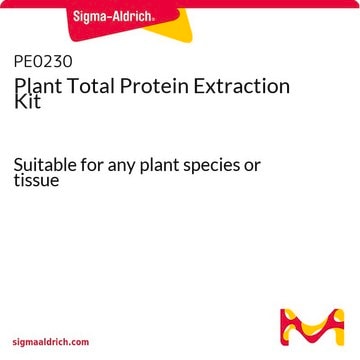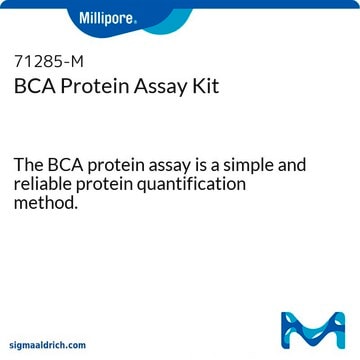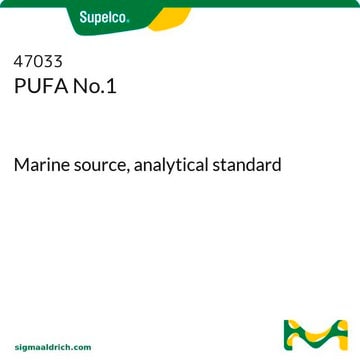R1137
Hind III from Haemophilus influenzae
Restriction Enzyme
Faça loginpara ver os preços organizacionais e de contrato
About This Item
Número CAS:
Número MDL:
Código UNSPSC:
12352204
Produtos recomendados
grau
for molecular biology
forma
buffered aqueous glycerol solution
concentração
≥10000 units/mL
10,000 units/mL
Condições de expedição
wet ice
temperatura de armazenamento
−20°C
Procurando produtos similares? Visita Guia de comparação de produtos
Especificidade
Recognition sequence: 5′-A/AGCTT-3′
Cutting results: 2-10-fold Hind III overdigestion of 1 μg λ DNA substrate results in 100% cutting
Heat inactivation: 65 °C for 15 minutes
Cutting results: 2-10-fold Hind III overdigestion of 1 μg λ DNA substrate results in 100% cutting
Heat inactivation: 65 °C for 15 minutes
Aplicação
HindIII, a restriction endonuclease, is used in molecular biology applications to cleave DNA at the recognition site 5′-A/AGCTT-3′ to generate DNA fragments with cohesive 5′-ends.
Outras notas
Supplied with 10x Restriction Enzyme Buffer SB (B8781)
Comment: Hind III under suboptimal reaction conditions will cleave secondary recognition sites (star activity).
forma física
Solution in 10 mM Tris-HCl, pH 7.5, 0.1 mM EDTA, 1 mM dithioerythritol, 250 mM NaCl, 0.01% polydocanol (v/v), 50% glycerol (v/v) at 4 °C
produto relacionado
tampão de incubação
Nº do produto
Descrição
Preços
Código de classe de armazenamento
12 - Non Combustible Liquids
Classe de risco de água (WGK)
WGK 1
Ponto de fulgor (°F)
Not applicable
Ponto de fulgor (°C)
Not applicable
Certificados de análise (COA)
Busque Certificados de análise (COA) digitando o Número do Lote do produto. Os números de lote e remessa podem ser encontrados no rótulo de um produto após a palavra “Lot” ou “Batch”.
Já possui este produto?
Encontre a documentação dos produtos que você adquiriu recentemente na biblioteca de documentos.
Stephen J King et al.
Molecular biology of the cell, 14(12), 5089-5097 (2003-10-21)
Cytoplasmic dynein and dynactin are megadalton-sized multisubunit molecules that function together as a cytoskeletal motor. In the present study, we explore the mechanism of dynein-dynactin binding in vitro and then extend our findings to an in vivo context. Solution binding
M Hsu et al.
Biochemistry, 17(1), 131-138 (1978-01-10)
In the presence of 100 mM Tris buffer (pH 7.5) and 1-10 mM Mg2+ EcoRI endonuclease cleaves DNA at a specific nucleotide sequence and in a characteristic way: -GAATTC-. But if Mg2+ is replaced by Mn2+, the specificity of the
Tomás Brdicka et al.
The Journal of experimental medicine, 196(12), 1617-1626 (2002-12-18)
A key molecule necessary for activation of T lymphocytes through their antigen-specific T cell receptor (TCR) is the transmembrane adaptor protein LAT (linker for activation of T cells). Upon TCR engagement, LAT becomes rapidly tyrosine phosphorylated and then serves as
C Kessler et al.
Gene, 92(1-2), 1-248 (1990-08-16)
The properties and sources of all known class-I, class-II and class-III restriction endonucleases (ENases) and DNA modification methyltransferases (MTases) are listed and newly subclassified according to their sequence specificity. In addition, the enzymes are distinguished in a novel manner according
Jaroslav Jelinek et al.
Epigenetics, 7(12), 1368-1378 (2012-10-19)
Genome wide analysis of DNA methylation provides important information in a variety of diseases, including cancer. Here, we describe a simple method, Digital Restriction Enzyme Analysis of Methylation (DREAM), based on next generation sequencing analysis of methylation-specific signatures created by
Nossa equipe de cientistas tem experiência em todas as áreas de pesquisa, incluindo Life Sciences, ciência de materiais, síntese química, cromatografia, química analítica e muitas outras.
Entre em contato com a assistência técnica







